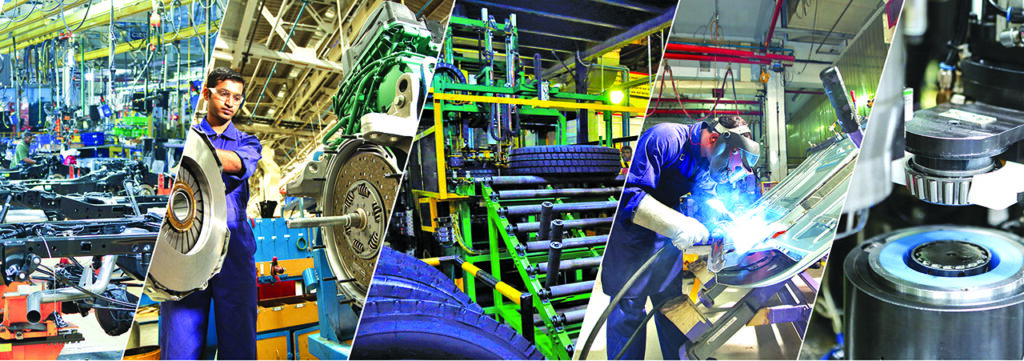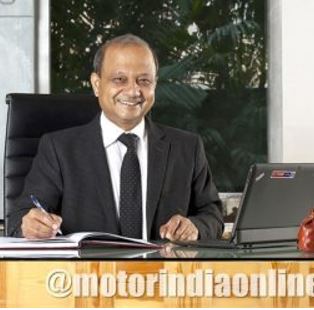Taking steps forward towards the vision of an ‘Aatmanirbhar Bharat’, Government led by Hon’ble Prime Minister, Shri Narendra Modi, has approved the PLI Scheme for Automobile Industry and Drone Industry with a budgetary outlay of ₹ 26,058 crore. The PLI scheme for the auto sector will incentivize high value Advanced Automotive Technology vehicles and products. It will herald a new age in higher technology, more efficient and green automotive manufacturing.

PLI Scheme for Automobile Industry and Drone Industry is part of the overall announcement of PLI Schemes for 13 sectors made earlier during the Union Budget 2021-22, with an outlay of ₹ 1.97 lakh crore. With the announcement of PLI Schemes for 13 sectors, minimum additional production in India is expected to be around ₹ 37.5 lakh crore over 5 years and minimum expected additional employment over 5 years is nearly 1 crore.
The Scheme for the auto sector envisages to overcome the cost disabilities to the industry for manufacture of Advanced Automotive Technology products in India. The incentive structure will encourage industry to make fresh investments for indigenous global supply chain of Advanced Automotive Technology products. It is estimated that over a period of five years, the PLI Scheme for Automobile and Auto Components Industry will lead to fresh investment of over ₹42,500 crore, incremental production of over ₹2.3 lakh crore and will create additional employment opportunities of over 7.5 lakh jobs. Further this will increase India’s share in global automotive trade.
The PLI Scheme for auto sector is open to existing automotive companies as well as new investors who are currently not in automobile or auto component manufacturing business. The scheme has two components viz Champion OEM Incentive Scheme and Component Champion Incentive Scheme. The Champion OEM Incentive scheme is a ‘sales value linked’ scheme, applicable on Battery Electric Vehicles and Hydrogen Fuel Cell Vehicles of all segments. The Component Champion Incentive scheme is a ‘sales value linked’ scheme, applicable on Advanced Automotive Technology components of vehicles, Completely Knocked Down (CKD)/ Semi Knocked Down (SKD) kits, vehicle aggregates of 2-Wheelers, 3-Wheelers, passenger vehicles, commercial vehicles and tractors etc.
This Scheme for automotive sector along with the already launched PLI scheme for Advanced Chemistry Cell (ACC) (₹18,100 crore) and Faster Adaption of Manufacturing of Electric Vehicles (FAME) (₹10,000 crore) will enable India to leapfrog from traditional fossil fuel based automobile transportation system to environmentally cleaner, sustainable, advanced and more efficient Electric Vehicles (EV) based system.
PLI Scheme enables auto component manufacturers to become globally competitive in cutting edge technologies – Sunjay Kapur, President, ACMA
Automotive Component Manufacturers Association of India (ACMA), the apex body representing India’s auto component manufacturing industry, welcomed the much-awaited Production Linked Incentive (PLI) Scheme for auto and auto component sector.

With an outlay of Rs.26,000 crore (~USD 3.5 billion) for five years commencing FY22-23, it will incentivise investments in new age automotive technologies such as automatic transmission assembly, electronic power steering system, sensors, super capacitors, ECUs, Parts of EVs, Hydrogen Fuel Cells and its parts, adaptive front lighting, automatic braking, tyre pressure monitoring system, and collision warning systems, among others.
Welcoming the PLI scheme, Mr. Sunjay Kapur, President ACMA said, “ACMA is grateful to the Hon’ble Prime Minister of India, Shri Narendra Modi for the announcement of the PLI scheme for the auto and auto components industry. In accordance with our national priorities of energy security and climate change & environment, the PLI scheme envisions creation of an ‘Atmanirbhar’ (self-reliant), globally competitive and future ready Indian automotive sector. Thrust on incentivising new age technologies will facilitate creation of a state-of-the-art automotive value chain in the country and give a much-needed impetus to manufacturing of cutting edge automotive products in India. Further, with global economies de-risking their supply chains, the PLI will aid India in developing into an attractive alternative source of high-end auto components”.
Earlier, the Government of India had announced the PLI for ACC batteries with an outlay of Rs. 18,100 crore (~USD 2.5 billion) aimed at inviting investments for manufacturing for advanced energy storage technology batteries, a first step towards creating a robust infrastructure for electric mobility in India.
PHDCCI – Sanjay Aggarwal, President

The announcement made by the government under production-linked incentive (PLI) scheme for automobile and auto component is a great step forward for promoting the sector. This would expand India’s domestic manufacturing capacity and export growth trajectory. The scheme will now provide a greater emphasis on technologically innovative auto components, such as automatic transmission, sensors, tyre pressure monitoring systems, battery electric vehicles, and hydrogen cells, among others, which will help exporters, become more integrated into global value chains.
It would also encourage businesses to invest in cutting-edge technologies and products that will help India gain a foothold in the global marketplace. Further, this scheme will improve the sector’s competitiveness and propel it to the next level of development.
TVS Motor Company – Venu Srinivasan, Chairman

“The revised focus of PLI scheme on alternative fuels, electric vehicles and utilisation of advanced technological innovation, will help the industry move faster towards the future technologies. There is a sense of haste in developing these technologies in India and this scheme gives the right impetus to the industry to move rapidly in that direction. Any country which aspires to lead in a particular sector needs government support and this scheme aims to do just that in the future mobility space. The pandemic has taught us the essence of Aatmanirbhar in every aspect possible. Hence, this is a significant push by the government for its workforce, organisations (OEMs), and the consumers to seek competitive, diverse, and climate conscious mobility solutions and a progressive India.”
Tata Motors – Girish Wagh, Executive Director

“We at Tata Motors are much encouraged with the new Production-Linked Incentive (PLI) scheme announced for the auto sector. This scheme is both progressive and transformational. It reiterates India’s holistic commitment to a sustainable future and accelerates the country’s progress towards green mobility. Several meaningful incentives have been offered across the entire value chain engaged in manufacturing of battery powered electric vehicles and hydrogen fuel cell, as well as its supporting infrastructure and exports. Encouraging production of auto components using advanced technologies will boost localisation, domestic manufacturing and also attract foreign investments. This will help component manufacturers strive for scale, which will require setting up of new facilities and create more jobs. With auto being a strategically important sector of the economy, the benefits accrued overall will result in a multiplier effect. This announcement is a significant milestone in India’s journey towards ‘Atmanirbharta’ and will enable the country to join the top echelons of auto manufacturing nations.”
Shailesh Chandra, President, Passenger Vehicle Business Unit, Tata Motors

“As a homegrown leading automotive brand in India, we at Tata Motors are delighted to see the new Production-Linked Incentive (PLI) scheme announced yesterday. The government has taken a holistic approach to make India ‘Aatmanirbhar’, especially in technology areas, that will be relevant and important in future. The scheme promotes manufacturing, export of electric vehicles and those running on hydrogen fuel cells, its supporting infrastructure, as well as new technology auto parts requiring advanced production techniques. A progressive scheme which will help in accelerating transition to smart, environment-friendly, sustainable mobility solutions. The automotive ecosystem will benefit tremendously as more jobs will be created, component manufacturers can plan their future roadmap better and achieve scale. It is indeed a very strong resolve shown by the government to fulfill the aspiration of India, by becoming a global manufacturing hub of green mobility.”
Toyota Kirloskar Motor – Mr. Vikram Kirloskar, Vice Chairman

“This day marks a milestone for the Indian automotive industry as the Government has announced the contours of the much-awaited Production Linked Incentive (PLI) scheme for the auto sector with special focus on Battery Electric Vehicles and Fuel Cell Electric Vehicles. Here, we would like to appreciate the efforts made by the Government of India as the scheme is quite distinct when compared to other sectoral schemes and it addresses existing competitive gaps and aims to foster rapid tectonic technological shifts to leverage opportunities arising from the realignment of global supply chains. The PLI scheme also proves to be timely so as to be able to revive the sectoral growth and lay the foundation for the country to become a global auto manufacturing hub.
At Toyota Kirloskar Motor (TKM), we believe the scheme will be instrumental in providing the desired impetus for ‘Make in India’ thereby reducing imports, and enabling the Indian automotive industry to move up the value chain into higher value-added technologies. Above all, it will help attract global investments as several automotive players are looking to diversify their supply chains owing to the pandemic and emerging geopolitical scenarios. For our part, as pioneers of electrified technologies, TKM will continue to focus on mass electrification by encouraging localization of electrified vehicle parts.”
Ashok Leyland – Mr Vipin Sondhi, MD & CEO & Vice President, SIAM

“The Automotive PLI scheme of Rs 26,058 Crores launched by the Union Government is all-inclusive. It provides incentives for incremental performance by the OEMs, as manufacturers move towards making India a strong hub for Electric Mobility while also looking at harnessing the potential of Hydrogen energy for automotive applications. It will also support other advanced automotive technologies.
PLI has the potential to substantially increase volumes and will provide a huge opportunity for exports to grow. This scheme is being announced at an opportune time for India as the auto industry realigns its supply chain globally. India can therefore capitalise on this changing scenario, to become an integral manufacturing base for the world.”

Daimler India Commercial Vehicles (DICV) – Mr. Satyakam Arya, Managing Director & CEO
“As a leading manufacturer and exporter of commercial vehicles, as well as a front runner in technology since inception, Daimler India Commercial Vehicles welcomes the opportunities offered by the newly announced PLI scheme. This initiative will encourage investment in vital technologies related to sustainability, carbon neutrality and more.”

CRISIL Research – Hemal Thakkar, Director
“Government support for newer technologies and EVs continue. Post FAME II and PMP, PLI will further unleash the potential for EVs in 2 and 3 wheelers. PVs and CVs will have to wait till they attain viability from a Total Cost of Ownership (TCO) perspective. Automotive component companies to see further improvement in cost competitiveness and will help position India as an export hub.”
VECV – Mr Vinod Aggarwal, MD & CEO, & Treasurer, SIAM

“Production Link Incentive Scheme for Automotive will result in ushering in more advanced technologies for new vehicles in our country, Such technologies will now be introduced, much faster, than what we have been seeing in last several years. Focus on next generation sensor-based safety and collision avoidance systems would go a long way in making the vehicles and our roads one of the safest in the world. PLI will also provide an opportunity for the Auto Industry to increase its Electric portfolios, as it will supplement the existing incentives of FAME and lower GST, for these vehicles.”